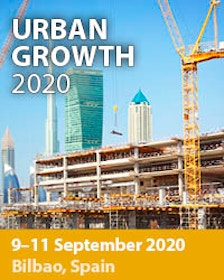The International Conference on Urban Growth and the Circular Economy was held for the first time in 2018 in Alicante. Following its success, it was decided to reconvene the event in Bilbao, Spain, in 2020.
The quest for the sustainable city has until recently focused on the efficient use of resources with the application of technical advances giving rise to the definition of SMART Cities. The economic model emphasised, however, is still “linear” in the sense that the design and consumption follow the pattern of extraction of natural resources, manufacturing, product usage and waste disposal.
The continuous growth of the urban population has recently given rise to the emergence of a new model which responds better to the challenges of natural resource depletion as well as waste management. This model has been called the “circular economy”.
The circular economy is a recent concept based on the reuse of what up to now has been considered wastes, reintroducing them into the production cycle. The objective of the circular economy is to reduce consumption and achieve savings in terms of raw materials, water and energy, thus contributing to the preservation of resources in order to reach sustainable development.
With its roots in environmental economics, the idea of the circular economy is to implement the life cycle of products, services, waste, materials and energy. The concept needs to be embedded not only in the original design but also in all process phases and during production, which ought to be as efficient as possible.
One of the most important of these resources is water which is becoming a scarce commodity in an ever-expanding world whose population demands a better standard of living. Water is required for agricultural purposes as well as by industry, in addition to its use by the general population. The recycling of water is an essential component of the circular economy.
Closely associated with the concept of the sustainable city and the circular economy is the need to develop networks, not only within the city itself but also across other city regions to ensure governance based on cooperation.
There is no possibility for the success of a long term economic policy without addressing the problems of natural resources and environmental pollution, which will affect the reuse of materials and products.
The current market economy based on a linear model from resource extraction, manufacturing, consumption and waste disposal, has not proved a long term suitable solution, in spite of the substantial efforts made in reducing its environmental impacts. This is largely due to the continuous population growth, in a society that demands high standards of living, thus requiring an ever-increasing share of natural resources.
The basis of the circular economy can be summarised as follows:
Eco-consumption: It starts with the evaluation of the possible environmental impacts of the process.
Industrial Ecology: The industrial phase is based on the principle of optimisation of components, the flow of materials, energy and services.
Economic Functionality: The process gives more importance to use than possession; ie to the sale of services rather than goods.
Reuse: Aim to use waste to create new products. This phase also involves the repairs, recycling and value-added procedures to prolong the life of any given products or services.
The achievement of the goals proposed by the circular economy requires the cooperation of the community, as well as technological changes and advances.
The need to base suitable development on the environmental, economic and social points of view, demands an integrated approach to solve the city problems including planning and development.
Hubung Penaja/Peserta Pameran
Marta Graczyk
[javascript protected email address]
Publish your content with EB Publishing
It's about who you reach. Get your news, events, jobs and thought leadership seen by those who matter to you.




